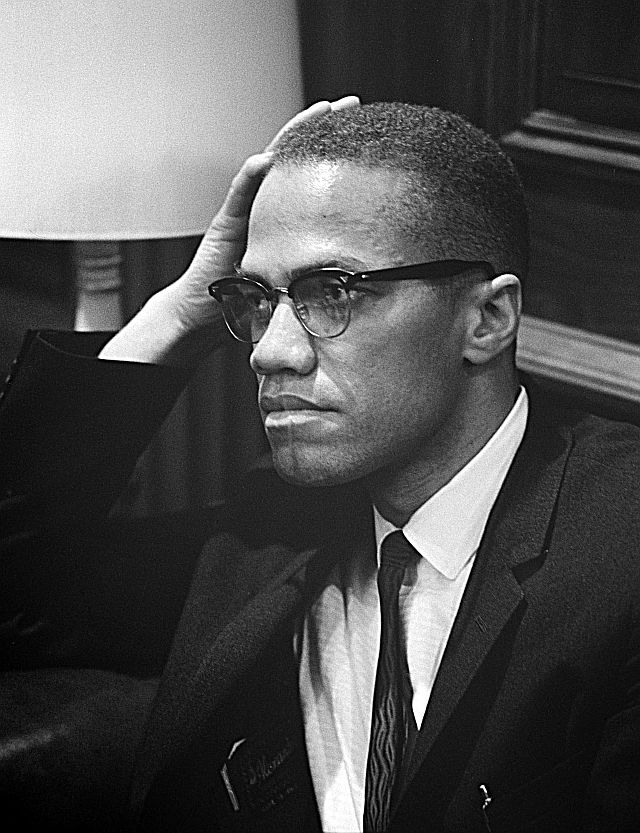Malcolm X on education – Infed.org

malcolm x on education. Malcolm x is a fascinating person to approach as an educational thinker, not because he was an academic or academically accomplished, but as an example of what someone who engages in self-education or “homemade” can achieve.
contents: introduction · homeschooling · conclusion · bibliography · how to cite this article
Malcolm X (1925 – 1965) was born Malcolm Little in Omaha, Nebraska, in 1925. His father was a Baptist minister and a great devotee of black leader Marcus Garvey. Garvey’s message, as many readers will be familiar with, was that black people in America could never live in peace and harmony with white Americans and their only hope for salvation was to return as a people to their roots in Africa. Malcolm’s father died when he was six years old and his mother was committed to an asylum when he was about twelve years old. as a result, his many brothers and sisters were separated and placed in different foster homes.
Malcolm left school early and eventually moved north, eventually settling in Harlem, New York, on his own, at the age of 17.
in harlem, he soon slipped into a life of crime. she got involved in con artists, in prostitution, in drug trafficking. he became a cocaine addict and a thief. finally, at the ripe age of 19, he was arrested and sentenced to 10 years in prison.
It was while he was in prison that his whole life changed. he first learned of the existence of the honorable elijah mohammed and the movement known as the black muslims from his brothers and sisters outside prison. they had converted to the movement and asked malcolm to write to elijah mohammed. In chapter 11 of his autobiography, Malcolm writes that “at least twenty-five times I must have written that first one-page letter to you, over and over again. he was trying to make it readable and understandable. I could hardly read my handwriting myself; I’m embarrassed to even remember it. my spelling and grammar were just as bad, if not worse.” This chapter of his autobiography is extremely moving, as it documents one man’s desperate search for an education.
homeschooling
Malcolm became a letter writer, and as a result, he says he “stumbled upon starting to get some kind of home schooling.” he became extremely frustrated at not being able to express what he wanted to convey in the letters he wrote. he says that “on the street he had been the most eloquent hustler there was…but now, trying to write simple English, he was not only not eloquent, he was not even functional”. his ability to read books was severely hampered. “Each book I collected had few sentences that did not contain one to almost all the words that could have been in Chinese.” he skipped words he didn’t know and therefore had little idea what the books said.
he bought a dictionary and began painstakingly copying each entry. it took him a day to do the first page. she copied it all down and then read aloud what he had written. she began to remember the words and what they meant. he was fascinated with the knowledge he was acquiring. he finished the a’s and went on to the b’s. over a period of time he finished copying the entire dictionary. Malcolm regarded the dictionary as a miniature encyclopedia. he learned about people and animals, about places and history, philosophy and science.
As his word base broadened, he found that he could pick up a book “and now begin to understand what the book was saying.” she says that “from then until I got out of that prison, every spare moment I had, if I wasn’t reading in the library, I was reading on my bunk. you couldn’t have wedged me out of a book.”
He preferred to read in his cell, but one of the problems he had was that at 10 at night, when they called to turn off the lights, he realized that he always seemed to coincide with him in the middle of something exciting. Fortunately, there was a light on the landing of her private cell and once her eyes adjusted to the brightness, she was able to sit on the floor by the cell door and continue her reading. he discovered that the guards came around once an hour so that, when he heard his footsteps approaching him, he would run back to his bunk until they had passed and pretend to be asleep. as soon as they were gone, he would go back to reading by the door. this would continue until three or four in the morning. he says that “three or four hours of sleep a night was enough for me. often in the years on the streets I had slept less than that.”
Malcolm read and read and read. he devoured history books and was amazed by the knowledge he gained about the history of black civilizations around the world. he read gandhi’s books about the struggle in india, he read about african colonization and the opium wars in china. he found within the library collection some bound pamphlets of the anti-slavery abolitionist society and was able to read for himself the descriptions of the atrocities committed against the slaves and the degradations suffered by his ancestors. “I will never forget how shocked I was when I began to read about the utter horror of slavery…book after book showed me how the white man had brought upon the black, brown, red and yellow peoples of the world all kinds of exploitative suffering ”. however, reading him was not limited to history. he read about genetics and philosophy. he read about religion.
He recounts that “ten guards and the warden couldn’t have dragged me out of those books… I have often reflected on the new perspectives that reading opened up for me. I knew right there in prison that reading had forever changed the course of my life.”
conclusion
Malcolm became a major figure in the fight against racism in the United States. he became a dynamic spokesman for black Muslims. he was feared by many, he was respected by many.
he never stopped wanting to learn. just before his death in 1965, she maintained that one of the things he most regretted in his life was his lack of academic education. he said that he would be very willing to go back to school and pick up where he left off and get a degree. “I would just like to study. I mean broad studies, because I have a very open mind. I’m interested in almost any topic you can mention.”
When he left black Muslims and formed his own organization, one of the roles he played was that of a teacher. he led a regular class for young people where he told them: “we have to get over the brainwashing we had…get out of your head what the man put…read everything. You never know where you’re going to get an idea. we have to learn to think…”
bibliography
flowering, h. (1996) alex haley & malcolm x the autobiography of malcolm x. Philadelphia, PA: Chelsea House.
decaro, l. (1998) Malcolm and the Cross: The Nation of Islam, Malcolm X, and Christianity. new york: new york university press.
haley, a. (ed.) (1965) the autobiography of malcolm x. New York: Grove Press, Inc. (also available in 1970 penguin paperback edition).
perry, b. (1991) Malcolm: The Life of the Man Who Changed Black America. barrytown, new york: station hill press.
links
brothermalcolm.net: full list of links etc.
malcolm-x.org – various resources
Acknowledgment: image: malcolm x – released into the public domain by its author, usa. uu. World News & Report (Library of Congress). Sourced from wikimedia commons.
how to cite this article: burke, b. (2004). ‘malcolm x on education’, the encyclopedia of pedagogy and informal education. [www.infed.org/thinkers/malcolm.htm retrieved: insert date].
© barry burke 2004
last updated Jan 28, 2013 by infed.org


